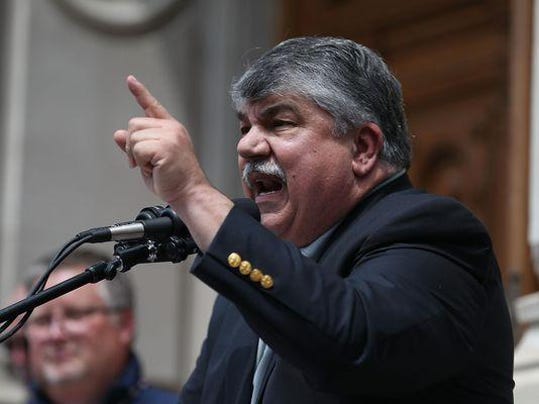Rank-and-File Unionists Overwhelmingly Disagree With AFL-CIO Czar About Right to Work Laws

A nationwide scientific survey has shown that 80% of union members agree that workers should “never be forced or coerced to join or pay dues to a union as a condition of employment.” But AFL-CIO czar Richard Trumka insists that the mere fact that Mike Pence agrees with most rank-and-file unionists disqualifies him for the vice presidency! Image: Joe Raedle/Getty Images
While professional political pundits like to think of unionized workers and their family members as a “voting bloc,” the fact is that on a wide array of issues the views of the union rank and file as a group don’t differ substantially from those of other Americans.
The Right to Work issue is a case in point, as a scientific nationwide survey conducted by pollster Frank Luntz for the National Right to Work Legal Defense Foundation has illustrated.
Polls of Americans who participate in statewide and presidential elections consistently show 70-80% support for Right to Work. And Luntz’ survey showed that 80% of union members agree that workers should “never be forced or coerced to join or pay dues to a union as a condition of employment.”
But top union bosses like AFL-CIO czar Richard Trumka strongly disagree with the overwhelming majority of the union rank and file as well as the public as a whole about compulsory unionism. Â They insist that all kinds of front-line employees, in the private and government sectors alike, should legally be forced either to join or bankroll a union that is installed as their “exclusive” bargaining agent. Workers who refuse, say Trumka et al., ought to be fired.
Moreover, a politician’s full-fledged support for forced unionism isn’t just a point in his or her favor, as far as the union hierarchy is concerned. To get any amount of support from the union political machine, a federal politician must, at a minimum, be fiercely opposed to national Right to Work legislation.
No wonder Trumka blew a gasket last week after presumptive GOP presidential nominee Donald Trump announced he had chosen Indiana Gov. Mike Pence as his running mate for the general election campaign.  (See the link below to read Detroit News reporter Michael Wayland’s account of Trumka’s reaction.)
While it was not Mr. Pence, but rather his immediate predecessor as governor, Mitch Daniels, who actually signed the Hoosier State’s Right to Work law in early 2012, Pence campaigned that year on a platform of defending the then-fledgling statute from political and judicial attacks.
Pence has made good on his word. Â Since he became Indiana’s chief executive, his administration has helped Attorney General Greg Zoeller successfully defend the Hoosier Right to Work law from Big Labor litigation in federal and state court. He and his appointees have also been willing, again and again, to give the ban on forced union dues and fees credit for helping attract job-creating businesses to Indiana.
According to Trumka, Pence’s staunch support for Right to Work is such a horrible offense that, in itself, it should disqualify him from holding the vice presidency.
And yet, as Frank Luntz’ 2010 survey and a host of other polls have subsequently shown, the stance Pence has taken is one supported by the overwhelming majority of the union rank and file.
In addition to publicly berating Mike Pence for agreeing with most union members about Right to Work and acting in accord with his professed beliefs, Trumka and other union bosses are lavishly spending those workers’ forced union dues to ensure that the Trump-Pence ticket never makes it to the White House.
In mid-June, after the AFL-CIO board formally endorsed Hillary Clinton for President, Trumka boasted, with regard to union bosses and other radical proponents of compulsory unionism, “[W]e will be the driving force to elect her President of the United States.” In this case, his bragging is probably justified.
In the 2014 cycle, Big Labor spent roughly $1.7 billion, mostly compulsory union dues and fees, on politics and lobbying, according to the National Institute for Labor Relations Research’s own estimate. There’s ample to reason to believe union bosses will pour an even greater amount of money confiscated from workers into this campaign cycle.
Such forced dues-funded electioneering pays for phone banks, get-out-the-vote drives, propaganda mailings, and other so-called “in-kind” support for union boss-favored candidates.
Regardless of how the individual unionized worker votes, it should be up to him or her to decide which candidates, if any, to support financially.
And by far the simplest and most effective way to ensure that what should be a personal decision really is one is for Congress to enact a national Right to Work law.

